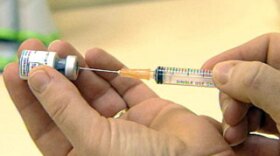Lawmakers in the state House and Senate are still working on a compromise COVID-19 relief package.
On Thursday, House lawmakers approved a $1.7 billion dollar package. GOP Representative Perrin Jones praised the bipartisan effort, and noted that the profound impacts of the coronavirus pandemic have not been equally felt.
"The beautician, the dental hygienist, and the retail clerk all in so-called non-essential occupations, have been affected more significantly than those able to work from home," he said. "Make no mistake. All work that is legal, ethical and morale is essential."
The House plan temporarily expands Medicaid coverage for COVID-19-related care, emphasizes buttressing remote K-12 education, helping North Carolina universities perform vaccine and antibody research, and treating virus patients. The Senate's approach includes more for small business loans, but less overall.
"We are going to try to work out the differences between the absolutely perfect plan of the House with the not-so-perfect plan of the Senate," said House Speaker Tim Moore. "To work those two things out together to come up with a compromise. Once we come up with that, weÔÇÖll be able to put those two things into legislation."
As with the $1.3 billion-plus Senate package, the House measure also alters temporarily laws or extends deadlines for things like teacher licensing and vehicle inspections made difficult with the stay-at-home order and shuttered schools. Both chambers also agreed to expand a low-cost loan program operated by the Golden LEAF Foundation to help small businesses struggling to survive, although the amounts they allocate differ by $50 million.
"Folks are looking for answers, folks are looking for relief." said Rep. Brenden Jones, a Columbus County Republican, before the nearly 100-page House bill passed 117-1. "And I think what we have here in this bill is a good start."
Budget-writers from both chambers moved later Thursday toward working out the differences in the competing measures, with a goal of sending a pair of complementary final bills to Democratic Gov. Roy Cooper's desk by Friday.
Cooper and his office have been significantly involved in crafting a product. They influenced Senate Republicans to add another $130 million to the chamber's package late Wednesday to boost rural and minority health, food banks and school nutrition programs serving 500,000 meals a day since the virus crisis began.
The Senate, which passed its package unanimously, has been more cautious with spending the $3.5 billion that North Carolina is receiving in coronavirus relief. The legislature's top economist has projected the state's tax revenues could miss projections through mid-2021 by $2.5 billion. Rules on using relief funds could be altered so they could fill budget shortfalls.
"We will get through this challenge by thoughtfully deploying the considerable resources we have at our disposal," Senate Majority Leader Harry Brown's office said in a news release. "It is not prudent to throw money around now that we may need in the near future."
But one House Democrat said the Senate measure is holding on to too much money. While the House plan immediately sends $350 million to county and city governments, the Senate plans distributes $100 million initially, with more if certain conditions are met.
"We need to act now. The relief is needed now, not six months in the future," said House Minority Leader Darren Jackson of Wake County.
Negotiators will have to decide whether to retain a House provision that would allow Medicaid to cover people temporarily making up to twice the poverty rate for COVID-19 treatment. The Senate wants to raise the maximum weekly unemployment benefit from $350 to $400 once federal and state benefits run out. The House also wants to allow restaurants with alcohol licenses to sell take-out mixed drinks during the emergency. The lone "no" vote on the House bill, Craven County GOP Rep. Michael Speciale, had tried to offer an amendment eliminating the alcohol measure.
The House vote on Thursday was performed under new operating rules that allowed legislators who chose to be absent out of health concerns to vote through the majority or minority leaders. Twenty-three Democrats and one Republican used the proxy vote option. Otherwise, most members on the floor tried to practice social distancing, and many wore surgical masks. The Legislative Building remains closed to the public.
"What an interesting time to be in Raleigh," quipped Rep. Donny Lambeth, a Forsyth County Republican, after taking off his mask to speak.
The Associated Press contributed to this report.







